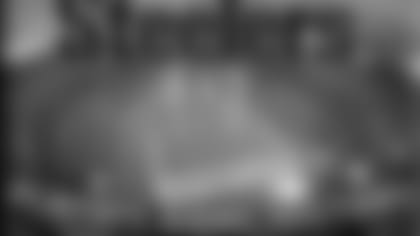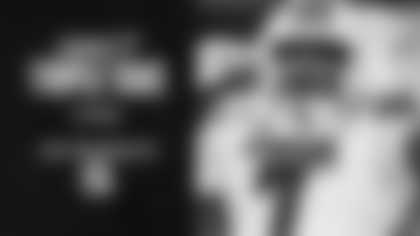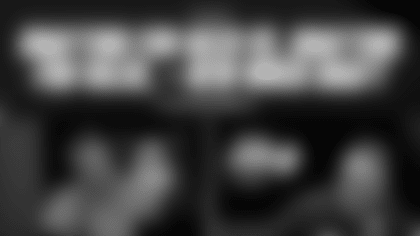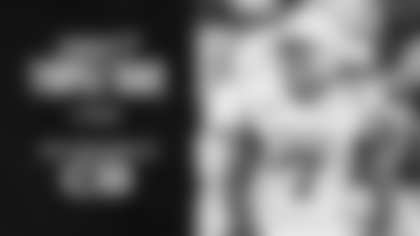Re-visiting Cowher's choice for 1992 playoffs
By BOB LABRIOLA
Steelers.com
Maybe it was just another example of a lesson learned after 15 years of making such decisions, because what Bill Cowher said in January 2008 was much different than what he did in January 1993.
Cowher is now a television commentator for CBS's "The NFL Today," and at halftime of the 2007 AFC Championship Game between the New England Patriots and San Diego Chargers he said this on the air: "I'm going to say this: I admire Philip Rivers' toughness. But right now, if I'm Norv Turner, I'm one half away from a chance to play in the Super Bowl; I believe (Rivers is becoming more a hindrance than an asset … I'm telling you: I'm thinking of (backup quarterback) Billy Volek now seriously in the second half of this game."
There are some former Steelers who wish Cowher had been thinking that way on Jan. 9, 1993.
Twelve months earlier, Cowher had been hired to follow Chuck Noll as coach of the Steelers, and his first season on the job deserves to be considered a successful one. But could it have been much more?
Cowher's first season is remembered as a six-month love affair filled with tactical successes and stirring victories on the field. From the fake punt in the opener against the defending division champion Oilers in Houston until the finale against the Browns that clinched the top seed in the AFC playoffs, the entirety of the Steelers 1992 season in reality was nothing like the popular memories of it.
On the day the 1992 Steelers reported to St. Vincent College, they had no starting quarterback; Greg Lloyd was ticked off about being moved from outside linebacker to inside linebacker, and he was vocal about it; Barry Foster didn't show up because he wanted more money even before he won the starting running back job, maybe because he knew that 1989's No. 1 pick Tim Worley was suspended for the season.
There was more. Louis Lipps, the team's leading receiver in each of the previous four seasons, a two-time Pro Bowl selection and the only proven big-play threat on the roster, wasn't in camp because he was one of four veterans who had played out their options and were without contracts. The others were two-time Pro Bowl tackle Tunch Ilkin, and both starting safeties – Carnell Lake and Thomas Everett. And speaking of the unsigned, there was the full complement of draft picks – No. 1 pick Leon Searcy, No. 2 pick Levon Kirkland and No. 3 pick Joel Steed.
Lipps never would play another down for the Steelers, but the rest of those issues worked themselves out over the preseason, and Ilkin was optimistic about the prospects for 1992. "I have a good feeling for this football team. We're still a long way off, but it's nice that we're getting on a roll at the right time. We feel confident. What you saw tonight was a football team starting to believe in itself, and that's one of the most important things to winning in this league. You've got to believe."
The belief was cemented in the Astrodome when the Steelers upset the heavily favored Oilers, 29-24. Neil O'Donnell had won the starting quarterback job in training camp, but the story of the Steelers' successes early in 1992 can be traced to Foster and the defense. The Steelers intercepted Warren Moon five times in the opener, and Foster posted the first of his 12 100-yard games that season. Cowher, the rookie coach, was 1-for-1.
"The coaches were making aggressive calls, and we were playing aggressively, and it spreads," said Rod Woodson, who had two of those five interceptions. "It's like a virus. We have a very aggressive offense and a very aggressive defense, and we play very aggressive on special teams. When you play that way, you come home with a victory. Guys were flying to the ball, and you have fun. When you have fun and you win, you find reasons to play."
Said San Diego running back Rod Bernstine, "When you looked at the schedule, Pittsburgh was not one of the teams you were afraid of," and that could have been a factor in the Steelers' 3-0 start. The team lost its next two, thanks to some offensive woes in the red zone, but then the Steelers went on a midseason tear.
They beat the Bengals, and then they went to Kansas City and defeated the Chiefs, which set up the rematch with the Oilers, with this one at Three Rivers Stadium. This time Woodson took Moon out of the game with a sack that caused a concussion, and when Al Del Greco was wide left from 39 yards out as time expired, the Steelers had won, 21-20, and were in control of the AFC Central Division.
"The fact we went to Kansas City and beat them there was a big win," said Ilkin. "Then we come here, and I'm sure the Oilers felt us beating them in Houston was a fluke, and I don't think they had a great deal of respect for us, so they figured they'd come and take this one in our house. The fact we swept them, this team is playing with a lot of confidence."
At 6-2, the Steelers went to Buffalo to face the defending AFC champion Bills, and even though they lost, 28-20, they made it a game for the first time in a long time. The Steelers had no answers for the K-Gun offense, especially Thurman Thomas' 155 yards rushing on 37 carries.
On the same day the Steelers got to 10-3 by defeating the Seahawks at Three Rivers Stadium, O'Donnell broke his fibula after throwing three interceptions. Bubby Brister took over at quarterback, but against Seattle it was Foster and his 125 yards on 33 carries that took over the offense.
Brister needed some time to shake off the rust, and the Steelers lost two straight games, both to NFC Central opponents. They had the misfortune to be the opponent when the Bears celebrated Mike Singletary Day at Soldier Field by winning, 30-6, and then the next weekend Minnesota's Terry Allen rushed for 172 yards on 33 carries in a 6-3 Vikings win.
In the regular season finale, Brister hit his stride. His first two passes were dropped, but then he completed 11 in a row to complement Foster's 103 yards in a 23-13 win over the Browns that clinched the AFC's top seed in the playoffs for the Steelers.
"Bubby had a great game," said Ilkin. "He had an outstanding grasp of what was going on. He was on a roll. He made the right calls, the right decisions. We were all doing our jobs individually, and so collectively the improvement was very noticeable."
The impact of the Steelers' regular season performance on the town was just as noticeable. Hosting an NFL playoff game for the first time since 1982, Pittsburgh was electric during the fortnight between the end of the regular season and the Divisional Round playoff game against the Bills. Buffalo would be playing the game without the injured Jim Kelly, but Cowher said O'Donnell would start for the Steelers, if healthy.
He might have been healthy, but O'Donnell certainly was ineffective.
Foster rushed for 104 yards (5.1 average), but that was negated by O'Donnell's four turnovers – two interceptions and two lost fumbles on sacks. Six times in the first three quarters the Steelers crossed the Bills 40-yard line, but they managed just one field goal. The defense held Thomas to 54 yards rushing, but Kenneth Davis gained 104 and Frank Reich threw two touchdown passes for the Bills, who ended up winning in a leisurely fashion.
With the Steelers unable to threaten Buffalo with their offense, it gradually became clear that only the final margin, not the outcome, was in doubt. It was 24-3.
"Offensively, we were not as efficient as we needed to be," said Cowher, who then defended his decision to start O'Donnell and not pull him in favor of Brister.
"I thought Neil hit some throws that made it evident to me that he wasn't rusty, to use that term. I thought that while Neil was throwing the ball well, we just couldn't come up with the plays to keep the drive going. Then we did have the turnovers."
Myron Cope, the color analyst on the team's radio broadcasts was one of many who disagreed. As part of his commentary on Jan. 11, 1993, Cope said, "The essence of Cowher's explanation for not making the switch from Neil O'Donnell to Bubby Brister was he did not perceive signs that O'Donnell was rusty from a month-long layoff, and that he thought O'Donnell was throwing the ball well. Or as he put it in another reference to O'Donnell's passes, 'He threw the ball not badly.' Well, you could argue; certainly you could argue with Cowher's assessment of O'Donnell's performance, but such a debate is beside the point. The point is that the principal reason for changing quarterbacks was the hope of providing a spark to an offense that simply was not getting the job done. It was a do-or-die game that cried out for Cowher to exhaust all remedies."
It was a mistake made by Cowher the coach. A mistake that likely would have been pointed out by Cowher the broadcaster.
|
This article has been reproduced in a new format and may be missing content or contain faulty links. Please use the Contact Us link in our site footer to report an issue.
|






